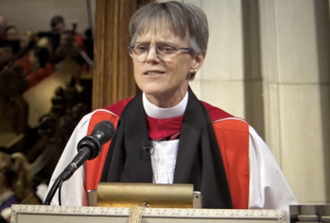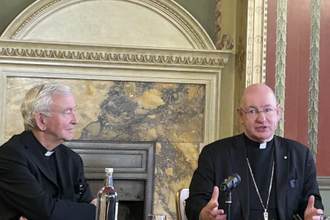Bishop makes direct appeals to Trump at Inaugural Prayer Service + video link

Screenshot
Source: Washington National Cathedral/ICN
At the Interfaith Inaugural Prayer Service at the Washington National Cathedral on Tuesday morning, the Episcopal Bishop of Washington, Rt Rev Mariann Edgar Budde made some pointed comments about the growing 'culture of contempt' in America. She went on to make direct appeals to President Trump to have mercy on the LGBT community and undocumented migrant workers. Referencing Trump's claim that he was saved by God from assassination, she said: "You have felt the Providential hand of a loving God. In the name of our God I ask you to have mercy upon the people in our country who are scared now."
The full homily text (transcribed by ICN) follows:
As a country this morning we have come together to pray for unity. As a people and a nation. Not for agreement, political or otherwise but for the kind of unity that fosters community across diversity and division . A unity that serves the common good. Unity in this sense is a threshold requirement for people to live in freedman together in a free society. It is the sold rock as Jesus said, in this case, upon which to build a nation. It is not conformity. It is not victory. It is not polite weariness, or passive passivity born of exhaustion. Unity is not partisan. Rather unity is a way of being with one another that it encompasses and respects our differences. That teaches us to hold multiple perspectives and and life experiences as valid and worthy of respect. That enables us in our communities and in the halls of power to genuinely care for one another. Even when we disagree.
Those across our country who dedicated their lives , or who volunteer, to help others in times of natural disaster, often at great risk to themselves, never ask those they are helping for whom they voted in a past election or what positions they hold on a particular issue. And we are at our best when we follow their example.
For unity at times is sacrificial. In the way that love is sacrificial. A giving of ourselves for the sake of another. In his Sermon on the mount, Jesus of Nazareth exhorts us to love, not only our neighbours, but to love our enemies. And to pray for those who persecute us. To be merciful as our God is merciful. To forgive others, as God forgives us. And Jesus went out of his way to welcome those who society deemed were outcasts.
Now I grant you that unity in its broad expansive sense is aspirational. And it's a lot to pray for. It's a big ask of our God. Worthy of the best of who we are and who we can be. But there isn't much to be gained by our prayers if we act in ways that further, deepen the divisions among us. Our Scriptures are quite clear about this. That God is never impressed with prayers when actions are not informed by them. Nor does God spare us from the consequences of our deeds which always in the end matter more than the words we pray.
Those of us gathered here in the Cathedral, we are not naive about the realities of politics. When power and wealth and competing interests are at stake, When views of what American should be are in conflict. When there are strong opinions across a spectrum of possibilities and starkly different understandings of what the right course of action is - there will be winners and losers.
When votes are cast, decisions made, that set the course of public policy and the prioritisation of resources. It goes without saying that in a democracy not everyone's particular hopes and dreams can be realised in a given legislative session. Nor a presidential term. Not even in a generation. Which is to say - not everyone's specific prayers - for those of us who are people of prayer - not everyone's prayers will be answered in the way we would like.
But for some, the loss of their hopes and dreams will be far more than political defeat, but instead a loss of equality and dignity, and their livelihoods. Given this then, is true unity among us even possible? And why should be care about it? Well I hope we care. I hope we care. Because the culture of contempt which has become normalised in this country threatens to destroy us.
We are all bombarded daily with messages from what sociologists now call the 'outrage industrial complex.' Some of that driven by external forces whose interests are furthered by a polarised America. Contempt fuels political campaigns and social media and many profit from that. But it's a worrisome, a dangerous way to lead a country.
I'm a person of faith. Surrounded by people of faith, And with God's help I believe that unity in this country is possible. Not perfectly. For we are imperfect people and an imperfect union. But sufficient enough to keep us all believing in and working to realise the ideas of the United States of America. Ideas expressed in the Declaration of Independence with its assertion of innate human equality and dignity. And we are right to pray for God's help as we seek unity. For we need God's help. But only if we ourselves are willing to tend to the foundations upon which unity depends.
Like Jesus's analogy of building a house of faith upon the rock of his teachings as opposed to building a house on sand. The foundations we need for unity must be sturdy enough to withstand the many storms that threaten it. So what are they these foundations of unity?
Drawing from our sacred traditions and texts let me suggest that there are at least three.
The first foundation for unity is honouring the inherent dignity of every human being, which is all all the faiths represented here affirm, the birthright of all people as children of our one God.
In public discourse honouring each other's dignity means refusing to mock, or discount or demonise those with whom we differ. Choosing instead to respect , respectfully debate our differences. And whenever possible to seek common ground. And if common ground is not possible, dignity demands that we remain true to our convictions without contempt for those who hold convictions of their own.
Second foundation for unity is honesty, in both private conversation and public discourse. If we're not willing to be honest there's no use in praying for unity, because our actions work against the prayers themselves. We might for a time experience a false sense of unity among some. But not the sturdier broader unity that we need to address the challenges that we face.
Now to be fair, we don't always know where the truth lies. And there is a lot working against the truth now. But when we do know, when we know what is true, it's incumbent upon us to speak the truth, even when, especially when, it costs us.
And the third and last foundation I'll mention today is humility - which we all need, because we are all fallible human beings. We make mistakes . We say and do things that we later regret. We have our blind spots and our biases. And perhaps we are most dangerous to ourselves and others when we are persuaded without a doubt that we are absolutely right and someone else is absolutely wrong . Because then we are just a few steps from labelling ourselves as 'the good people' versus 'the bad people'. And the truth is that we're all people. We're both capable of good and bad.
Alexander Solzhenitzyn once said: 'it's astutely observed that the lines separating good and evil passes not through states, not between classes nor between political parties but through, right through every human heart.' Through all human hearts. And the more we realise this the more room we have within ourselves for humility and openness to one another across our difference because in fact we are more like one another than we realise. And we need each other.
Unity is relatively easy to pray for on occasions of great solemnity . It's a lot harder to realise when we're dealing with real differences in our private lives and in the public arena. But without unity we're building our nation's house on sand. And with a commitment to unity that incorporates diversity and and transcends disagreement . With the solid foundations of dignity, honesty and humility that such unity requires, we can do our part and in our time to realise the ideals and the dream of America.
Let me make one final plea, Mr President. Millions have put their trust in you. And as you told the nation yesterday you have felt the Providential hand of a loving God. In the name of our God I ask you to have mercy upon the people in our country who are scared now. There are gay, lesbian and transgender children in Democratic, republican and Independent families , some who fear for their lives. And the people. The people who pick our crops and clean our office buildings, who labour in poultry farms and meat packing plants, who wash the dishes after we eat in restaurants and work the night shifts in hospitals. They may not be citizens, or have the proper documentation. But the vast majority of immigrants are not criminals. They pay taxes. And are good neighbours . They are faithful members of our churches and mosques , synagogues , gurdwaras and temples.
May I ask you to have mercy Mr President on those on our communities whose children fear that their parents will be taken away. And that you help those that are fleeing war zones and persecution in their own lands, to find compassion and welcome here. Our God teaches us that we are to be merciful to the stranger - for we were all once strangers in this land.
May God grant us the strength and courage to honour the dignity of every human being. To speak the truth to one another in love. And walk humbly with each other and our God , for the good of all people, the good of all people in this nation and the world. Amen.
Watch the homily here: www.youtube.com/watch?v=xwwaEuDeqM8


















